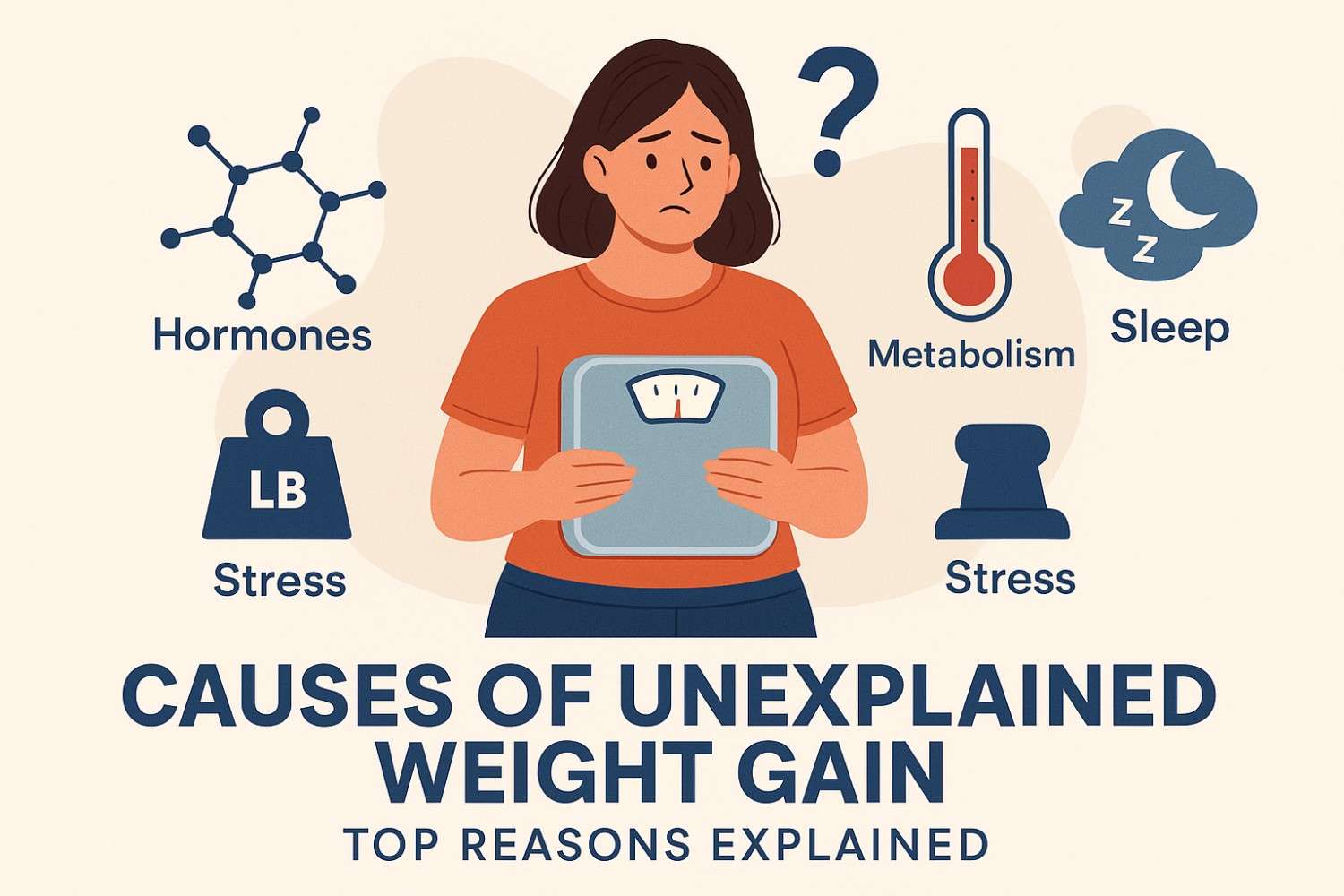Weight gain can feel frustrating, especially when you’re doing “everything right.” You may be eating healthy, sticking to an exercise routine, or even tracking calories — yet the number on the scale keeps creeping up. The truth is, weight gain isn’t always about overeating or lack of discipline. Your body is influenced by a complex mix of hormones, habits, lifestyle factors, and even your environment. Understanding what’s really going on is the first step to taking back control.
Here are the top causes of weight gain — explained simply and clearly.

1. Your Body’s Metabolism Changes Over Time
Metabolism is the process by which your body converts food into energy. As we age, our metabolism naturally slows down. After age 30, muscle mass begins to decline, and since muscle burns more calories than fat, your body starts burning fewer calories at rest.
This means:
- You can eat the same amount you always have…
- Do the same workouts…
- But still slowly gain weight.
What you can do:
Add strength training to your routine. Building muscle boosts metabolism and helps you burn calories even while resting.
2. Hormones Can Sabotage Your Progress
Hormones control how your body stores fat, when you feel hungry, and how energetic you feel. Several hormonal imbalances can contribute to weight gain, including:
- Thyroid issues (Hypothyroidism): Slows metabolism and increases fatigue.
- Cortisol (stress hormone): High stress triggers cravings for sugary, fatty, “comfort” foods.
- Insulin resistance: Causes blood sugar spikes and encourages fat storage, especially around the belly.
- Sex hormones (estrogen/testosterone changes): Menopause and aging can shift where fat accumulates.
What you can do:
If you suspect hormones are an issue, talk with a healthcare professional. Testing may reveal simple changes that could make a huge difference.
3. Chronic Stress and Poor Sleep Affect Your Appetite
When you’re stressed or tired, your body produces more cortisol. Cortisol increases hunger and cravings — especially for quick-energy foods like sweets and carbs. Lack of sleep also disrupts the hormones responsible for appetite:
- Ghrelin (hunger hormone): Increases when you’re tired, making you feel hungrier.
- Leptin (fullness hormone): Decreases, so you don’t feel satisfied even after eating.
In other words, sleep deprivation tricks your brain into thinking it needs more food.
What you can do:
Aim for 7–9 hours of quality sleep each night and add relaxing routines such as a quiet walk, deep breathing, or reading before bedtime.
4. Medications Can Cause Unexpected Weight Gain
Certain common medications list weight gain as a side effect. These include:
- Antidepressants and anti-anxiety medications
- Birth control pills
- Corticosteroids
- Diabetes medications
- Beta blockers for blood pressure or heart disease
They may increase appetite, slow metabolism, or change the way your body stores fat.
What you can do:
Never stop taking a medication without guidance — but speak with your doctor about alternatives if weight gain becomes a concern.
5. Liquid Calories Add Up Quickly
You may be tracking your meals perfectly… but what about your drinks?
Items like:
- Soda
- Coffee drinks with syrups and cream
- Alcohol
- Energy drinks
- Even fruit juice
…can pack more calories than a full meal, yet they don’t make you feel full.
What you can do:
Swap sugary drinks for water, sparkling water, or unsweetened tea. Even a small change — like cutting out one sugary drink per day — can lead to noticeable weight loss over time.
6. Mindless Eating and Portion Distortion
Modern life encourages distracted eating — eating while watching TV, working, or scrolling on your phone. When you’re not paying attention, it’s easy to overeat because your brain doesn’t register that you’re satisfied.
Restaurants also serve portions much larger than what your body needs.
What you can do:
Practice mindful eating — eat slowly, chew thoroughly, and enjoy your food without multitasking. You’ll naturally eat less.
7. Sedentary Habits Sneak In More Than You Think
Even if you exercise daily, sitting for long stretches can stall metabolism. Many of us sit at computers, in cars, or on couches for 8–10 hours a day.
What you can do:
Stand up and stretch every hour, take short walks, and incorporate more movement throughout your day.
The Bottom Line: Weight Gain Isn’t Just About Food
Weight gain can stem from a variety of internal and external factors, and it’s often more complex than simply eating too much. Rather than feeling discouraged, try tuning in to what your body is telling you. Small, steady lifestyle adjustments — such as improving sleep, managing stress, building muscle, and practicing mindful eating — can gradually guide you toward a healthier weight and overall well-being.
If you need additional guidance or support, medical weight loss in Sandy, UT offers personalized strategies and professional care to help you reach your goals safely and effectively.











